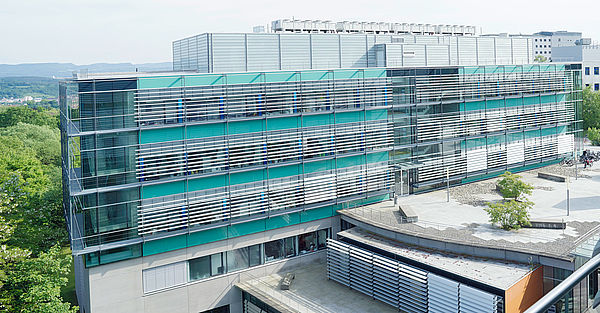The Breakthrough Prize is awarded in various fields and is considered the world’s largest science prize. Thomas Gasser, chairman of the board of directors at the Hertie Institute for Clinical Brain Research at the University of Tübingen and medical director of the Department of Neurology and Neurodegenerative Diseases at the University Hospital of Tübingen, is also a senior researcher at the Tübingen site of the German Center for Neurodegenerative Diseases (DZNE).
In Parkinson’s disease, certain neurons in the brain that produce the neurotransmitter dopamine deteriorate. The resulting dopamine deficiency causes motor impairments such as tremors, slowed movements, muscle stiffness and balance disorders. In the advanced stages of the disease, some patients also develop dementia. The reason for the death of these brain cells is still not fully understood. In the 2000s, Thomas Gasser as well as Ellen Sidransky and Andrew Singleton, the latter are both based in the U.S., discovered that mutations (deviations from the regular form) in certain genes increase the risk for Parkinson’s, and that some mutations even inevitably trigger the disease. The “Breakthrough Prize in Life Sciences” recognizes these pioneering achievements: They have expanded the understanding of the molecular mechanisms of Parkinson’s disease and paved the way for studies in which new therapeutic concepts are currently being investigated. These seminal findings on genetic risk factors for Parkinson’s were partly made independently and partly in collaboration between the award-winning researchers.
Defective enzymes
The aforementioned mutations affect the LRRK2 (pronounced “LERK2”) and GBA1 genes. “Each of these genes contains the blueprint for a specific enzyme. The mutations cause these enzymes to not function optimally. The bottom line is that they cause damage,” explains Thomas Gasser. “The consequences are severe. LRRK2 is involved in various processes within neurons; among other things, it ensures that the cells’ power plants function correctly and provide energy. On the other hand, both LRRK2 and GBA1 are important for recycling and eliminating waste products of cellular metabolism.” On the one hand, the described mutations are relevant to the hereditary (“familial”) form of Parkinson’s disease, in which affected individuals inevitably develop the disease in each family generation – often before the age of 50. On the other hand, some of these genetic variants are also risk factors for the much more frequent “sporadic” form of Parkinson’s disease, which typically manifests after the age of 60 and whose triggers cannot be clearly named.
Prospects for therapy
As yet, there is no cure for Parkinson’s disease. However, its symptoms can be treated and alleviated quite well for a certain period of time. Often, it is even possible to keep the effects of the disease in check for years, so that affected individuals are only slightly restricted in their everyday lives. “However, the currently available therapies only have a symptomatic effect and do not address the roots of the disease. Therefore, they cannot stop the brain’s degradation and sooner or later lose their efficacy,” Gasser says. “However, our findings on the LRRK2 and GBA1 genes provide approaches for treatments targeting molecular causes, which are being pursued in various ways. I am confident that one day it will be possible to prevent Parkinson’s or at least delay the onset of the disease and slow its progression.”
New approaches
Indeed, the pharmaceutical industry is working on inhibitors to curb the mutated LRRK2 enzyme and its harmful effects. Meanwhile, in Tübingen, Gasser and colleagues are preparing a clinical trial aimed at patients with Parkinson’s disease and GBA1 mutation. “People with GBA1 mutation tend to develop a particularly severe form of Parkinson’s. They often develop dementia relatively early in the course of the disease. We want to investigate whether we can prevent or at least delay mental decline. This means that we aim to provide preventive treatment before symptoms of dementia manifest. Although this would not eliminate the motor disorders, it would make a significant contribution to the quality of life. To this end, we will use antibodies to target certain deposits that accumulate in the brain during Parkinson’s disease. Clinical trials are scheduled to begin next year,” says Gasser.
Voices on the award
Prof. Dr. Bernd Pichler, Dean of the Medical Faculty Tübingen: “We are delighted that Prof. Dr. Thomas Gasser has been awarded the Breakthrough Prize for his pioneering Parkinson’s research. Prof. Gasser is an outstanding neuroscientist and neurologist and internationally highly respected which is clearly expressed by this luminory award. His groundbreaking work has deepened our understanding of Parkinson’s disease and advanced innovative approaches. Prof. Gasser impressively exemplifies Tübingen’s research focus in the field of neurology and we are proud of his success.”
“We as the Hertie Foundation are also very proud of this outstanding honor for Prof. Gasser. We are firmly convinced that the unique structure at the Hertie Institute for Clinical Brain Research, which we support, has enabled Mr. Gasser to do excellent clinical work and, in parallel, to conduct his groundbreaking research on Parkinson’s disease,” says Frank-Jürgen Weise, Chairman of the Board of the Hertie Foundation.
“Thomas Gasser has been and continues to be a world leading scientist whose research has led to the better understanding of Parkinson’s disease and other neurodegenerative disorders,” says Prof. Dr. Pierluigi Nicotera, Chairman of DZNE’s Executive Board. “Prof. Gasser has been an outstanding leader, he has helped the development of many clinician scientists and his work has been instrumental to conceive new personalised treatments which in the future will help defeating Parkinson’s disease.”
International collaboration
Mutations in the LRRK2 and GBA1 genes are among the most common genetic risk factors for Parkinson’s disease that are known today. However, experts suspect that there are others – as yet undiscovered. The Tübingen team led by Gasser is therefore participating in international research projects in which the genome of thousands of individuals with Parkinson’s is being studied. “Some of the genetic risk factors that have been found by now are not evenly distributed. Globally, there are certain differences in prevalence between population groups and regions. Such findings are important for the development of individualized therapies and can only be achieved through international collaboration,” Gasser says. “From this, we expect to gain insights not only into the familial form of Parkinson’s, but also into the non-hereditary, so-called sporadic variant. Our studies have shown that genetic factors also play an important role here. Although they are not singular causes of Parkinson’s, they are nevertheless significant, for example, for the risk of disease, the age of onset or disease severity.”
Background:
Parkinson’s disease is the second most common neurodegenerative disorder after Alzheimer’s. It manifests in particular through movement disorders and generally occurs in older adulthood: The vast majority of patients are at least 60 years old. In many cases, it is possible to alleviate disease symptoms over a period of years with medication and physiotherapy before the current therapies lose their effect due to the steadily progressing brain damage. To date, there is no cure for the disease. In Germany, at least 200,000 individuals are affected by Parkinson’s, and the number is increasing.
About the Breakthrough Prize:
Founded in 2012 by sponsors Sergey Brin, Priscilla Chan & Mark Zuckerberg, Julia & Yuri Milner, and Anne Wojcicki, the Breakthrough Prize is the world’s largest international science prize, awarded annually. The current laureates will be celebrated next April 13 at the 10th annual Breakthrough Prize ceremony, held in Los Angeles, USA. https://breakthroughprize.org/
More information:
Download the full press release
Watch the video about the Breakthrough Prize on Youtube: youtu.be/iu0hedCdj8c;
Listen to an Interview of Thomas Gasser with the SWR2 (in German): https://www.swr.de/swr2/wissen/weltweit-groesster-wissenschaftspreis-geht-an-tuebinger-forscher-gasser-100.html
Learn more about Prof. Gasser's research at the HIH here

Caption. Prof. Dr. Thomas Gasser
Credit: Verena Müller, UKT
Contact:
Prof. Dr. Thomas Gasser
Center of Neurology
Hertie Institute for Clinical Brain Research
Department for Neurodegenerative Diseases
Hoppe-Seyler-Straße 3
72076 Tübingen
Email: thomas.gasser@uni-tuebingen.de
Press contact:
Silke Dutz
Hertie Institute for Clinical Brain Research
Otfried-Müller-Str. 27
72076 Tübingen
Phone: +49 7071 29-88802
Email: silke.dutz@medizin.uni-tuebingen.de









